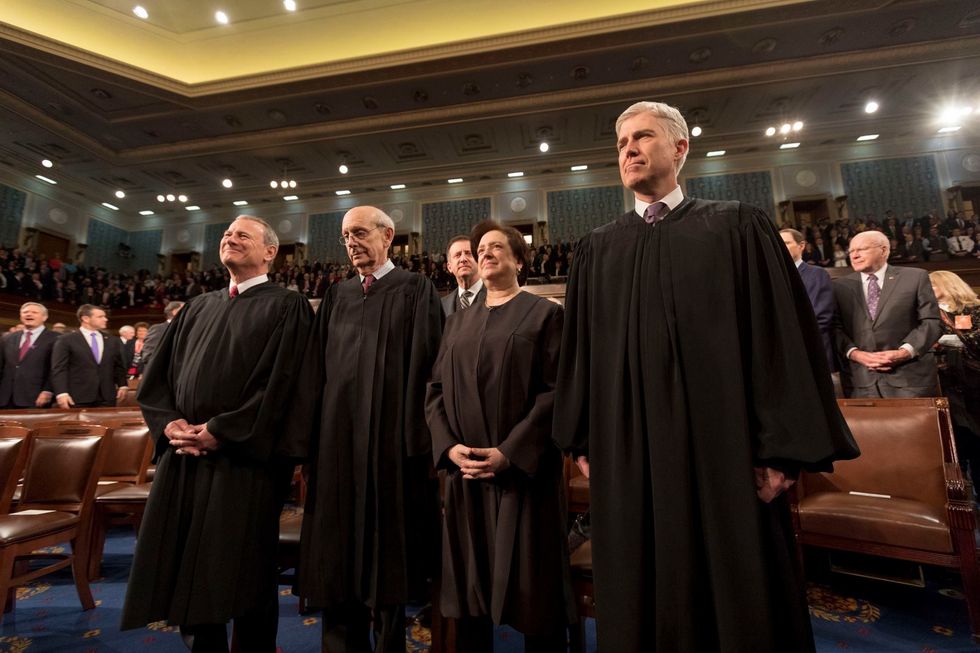In discussing the annual State of the Union Address given by the President of the United States, media outlets and members of Congress have described it as a moment in which partisan divide is put aside in favor of just "being American." An analysis of the address, however, reveals that partisan divide is anything but absent from the event. Specifically, the decision of each of the individuals in the chamber on whether to clap or not is a carefully calculated political move. Here's the breakdown of the politics behind the clapping.
During the course of the State of the Union Address, it was rather uncommon to spot a member of the Democratic Party clapping to the words of the Republican President. One clear exception, however, was Senator Joseph Manchin (D-WV). In the case of when Trump criticized individuals who knelt during the national anthem and his mentioning of rising wages, Manchin, seated towards the front of the center aisle, was seen enthusiastically clapping as most Democrats remained motionless.
So why was Manchin clapping as the rest of his party refrained from doing so? The answer is simple; Senator Manchin's reelection is this year, having been elected to his term in 2012. Unsettling for him, his state of West Virginia overwhelmingly voted in favor of Trump, a Republican candidate, in the 2016 Presidential Election. For the sake of safety in the next election, Manchin, against the common-seen behavior amongst fellow Democrats, was clapping for a president from the opposition party.
A parallel scenario can be seen from a Senator on the other side of the aisle. During his address, speaking on ObamaCare, Trump stated, "We repealed the core of the disastrous ObamaCare. The individual mandate is gone." As these words left the President's mouth, he received in response to a thunderous applause from his party. The overwhelming and unmistakable excitement can be seen across the aisle, but Senator Lisa Murkowski (R-AK) who was instrumental in the efforts to kill the efforts to repeal the Affordable Care Act, seems less than supportive of the President's comments.
Looking beyond elected officials, this careful political calculation can likewise be seen in Supreme Court Justices as well as the members of the military community.
"Working with the Senate, we are appointing judges who will interpret the Constitution as written including a great new Supreme Court Justice." While taking a jab at liberal justices, this statement by President Trump, as any individual who has kept up with current events could figure out, was an obvious compliment directed towards Justice Neil Gorsuch. However, those viewing the address clearly saw a completely expressionless Gorsuch refuse to even acknowledge the President's compliment with so much as a smile.
This goes the same with the rest of the justices as well as military officials, who remained expressionless for most statements even as others in attendance reacted plenty. The one occasion on which both military officials and SCOTS justices applauded is when the President honored the heroic actions of Staff Sergeant Justin Peck, who risked his own life in order to save Chief Petty Officer Kenton Stacy's life after he was injured by an IED blast. In this scenario, both groups applauded overwhelmingly. The reasoning behind their discrimination between what heeds applause and what heeds restraint simply is sourced from the nature of their positions. Both military officials, as well as justices, must make careful and coordinated choices concerning which statements made by the President are uncontroversial enough for them to be able to applaud. Essentially, they must discriminate between what is partisan platitude and what isn't.
While it is often said that politics are put aside during the President's State of the Union Address, as this year's address has shown, politics takes on a significant role in the actions of individuals present in the chamber. With each decision on whether to clap or not being a carefully calculated political play, the difference between thunderous applause and a daunting silence in today's divided federa government has the potential of sending a powerful message of immense caliber.

















